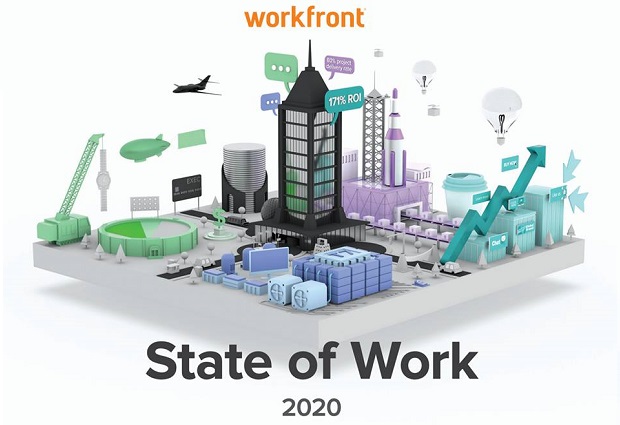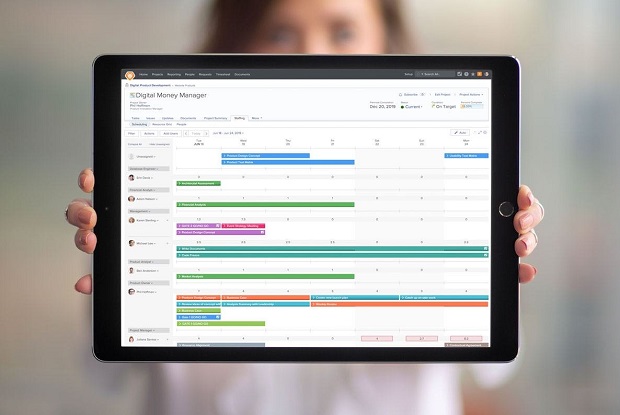Below is our recent interview with Steve ZoBell, CTO of Workfront:

Q: This is the 6th year for the State of Work report. What’s surprising to you?
A: One of the biggest surprises is that companies have gained almost no ground in helping workers focus on strategic work, even with all the advances in technology during that time. On average, the global workforce spends just 40% of their work week on the jobs they were hired to do and way too much time on low-value activities.
That’s despite companies worldwide investing heavily in business reengineering and technology. The IDC predicts that companies will spend roughly $2 trillion annually on digital transformation by 2022. However, 43% of the employees we surveyed said the number of work applications their companies provide actually make them less productive. All of that investment isn’t helping workers.
Q: How are employees feeling about their jobs?
A: The majority of employees are highly engaged, accountable and responsible. They want to do vital, strategic work that makes a difference. They care about their jobs and they care about the big picture. In fact, 65% said they wish they were rewarded more on results rather than for deliverables.
Ninety-one percent of those surveyed told us they’re proud of their work, 89 percent believe their role matters and 78% say their job is more than a paycheck.
Unfortunately, there are some aspects of their work that make it harder for these engaged employees to do the work they love and contribute to their companies.
 Recommended: Meet PanTech Design – Software Development Firm Bringing Home Automation into the Renewable Energy Space
Recommended: Meet PanTech Design – Software Development Firm Bringing Home Automation into the Renewable Energy Space
Q: What are their top challenges?
A: Workers aren’t getting enough support in their desire to focus on strategic work. The reasons why include productivity-blockers like wasteful meetings, excessive emails, excessive oversight, poor work prioritization, and a lack of standard processes for workflow.
Employees also sometimes lack the information they need to do their best work, and many express uncertainties about their company’s decision-making. Fewer than half of survey respondents believe decisions are based on data while 25% aren’t sure how company decisions are made at all.
Q: Are digital tools helping them to get more done?
A: Technology is intended to make employees more productive. The number of work applications and communications options is staggering. But digital tools such as email, instant messaging and social media are interrupting employees’ work by creating digital distractions. Scientific study indicates it can take more than 20 minutes after an interruption for a person to return to an original task. This understandably contributes to employee stress.
Sadly, the workers we surveyed are interrupted an average of 13.9 times per day. That means employees are spending 278 minutes – 4.63 hours! – a day merely trying to get back on task after interruptions. That amounts to an unbelievable 23 hours a week in lost productivity.
Digital tools intended to increase communication and collaboration are straining worker productivity and well-being. These tools are making it difficult for employees to get work done and are making them feel less productive.
Q: What do they think about technology?
A: Even though almost half of workers say their companies’ technology investment has made them less productive, they remain optimistic that the right technology solutions can enhance their ability to contribute. Eighty-eight percent of respondents say that technology is an important part of the employee experience.
However, technology is becoming a stumbling block for many of them, with almost half struggling with outdated technology. Eighty-four percent believe that businesses are missing opportunities by not moving to more modern technology solutions, such as a modern work management application platform. Ninety-one percent crave such solutions because they know they can enhance their ability to contribute to their organizations.
 Recommended: DataGrail Raises $5M In Series A Funding For Its Purpose-Built Platform For Sustained Data Privacy Compliance
Recommended: DataGrail Raises $5M In Series A Funding For Its Purpose-Built Platform For Sustained Data Privacy Compliance
Q: What do employees want in the future?
A: All signs indicate the consumerization of work is the future of work. Eighty-six percent of respondents say next-generation employees expect workplace technology that looks a lot more like Amazon, Google and Instagram in terms of information access, user experience, personalization and connection. Ninety-four percent say searching for information at work should match the ease of Googling in their personal time. According to our survey, workplaces with modern technology attract and keep the best talent.
Seventy-one percent would like to have a single online destination to work, such as a platform that combines project management, intelligent work automation and in-context collaboration, to better understand and manage their work. But 69% say they don’t have such a solution now.
Beyond technology, employees want to understand how they contribute to company goals and objectives. When they do, they feel valued, take pride in their work and align themselves with the company’s overall strategy, which is hugely beneficial to employees and companies alike.

